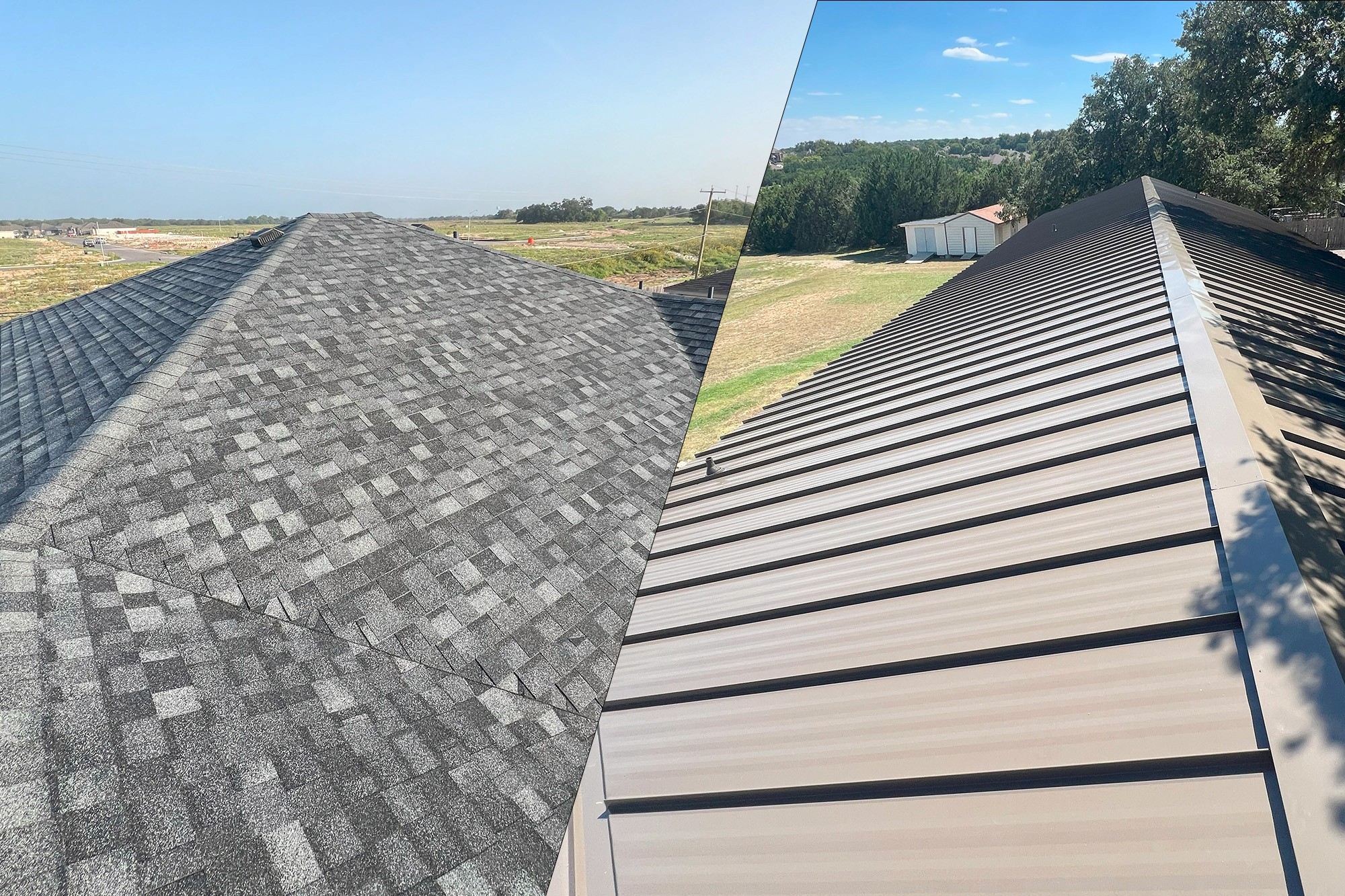Metal Roof vs. Shingles: Best Choice for Hot Climates
Dec 5, 2024
When it comes to choosing the right roofing material for homes in hot climates, homeowners often debate between metal roofs and asphalt shingles. With Texas summers bringing extreme temperatures, high winds, and heavy rain, selecting the right roofing option can significantly impact energy efficiency, durability, and overall comfort. In this comprehensive guide, we’ll explore the benefits and drawbacks of metal roofing and shingle roofs, helping you make an informed decision about the best roofing solution for your home.
Understanding the Basics: Metal Roof vs. Shingles
Metal Roofs
Metal roofs are crafted from materials such as aluminum, steel, zinc, or copper. These roofs are known for their durability, longevity, and ability to perform well under extreme weather conditions. Standing seam metal panels, one of the most popular types of metal roofing, feature raised seams that prevent water infiltration, making them ideal for areas with heavy rain or severe weather.
Key Features of Metal Roofs:
Lifespan: Typically lasts 40-70 years with minimal maintenance.
Reflectivity: Metal roofs reflect sunlight, reducing heat absorption and cooling costs during summer months.
Fire Resistance: Metal is non-combustible, making it highly resistant to fire.
Eco-Friendly: Made from recyclable materials and reduce waste sent to landfills.
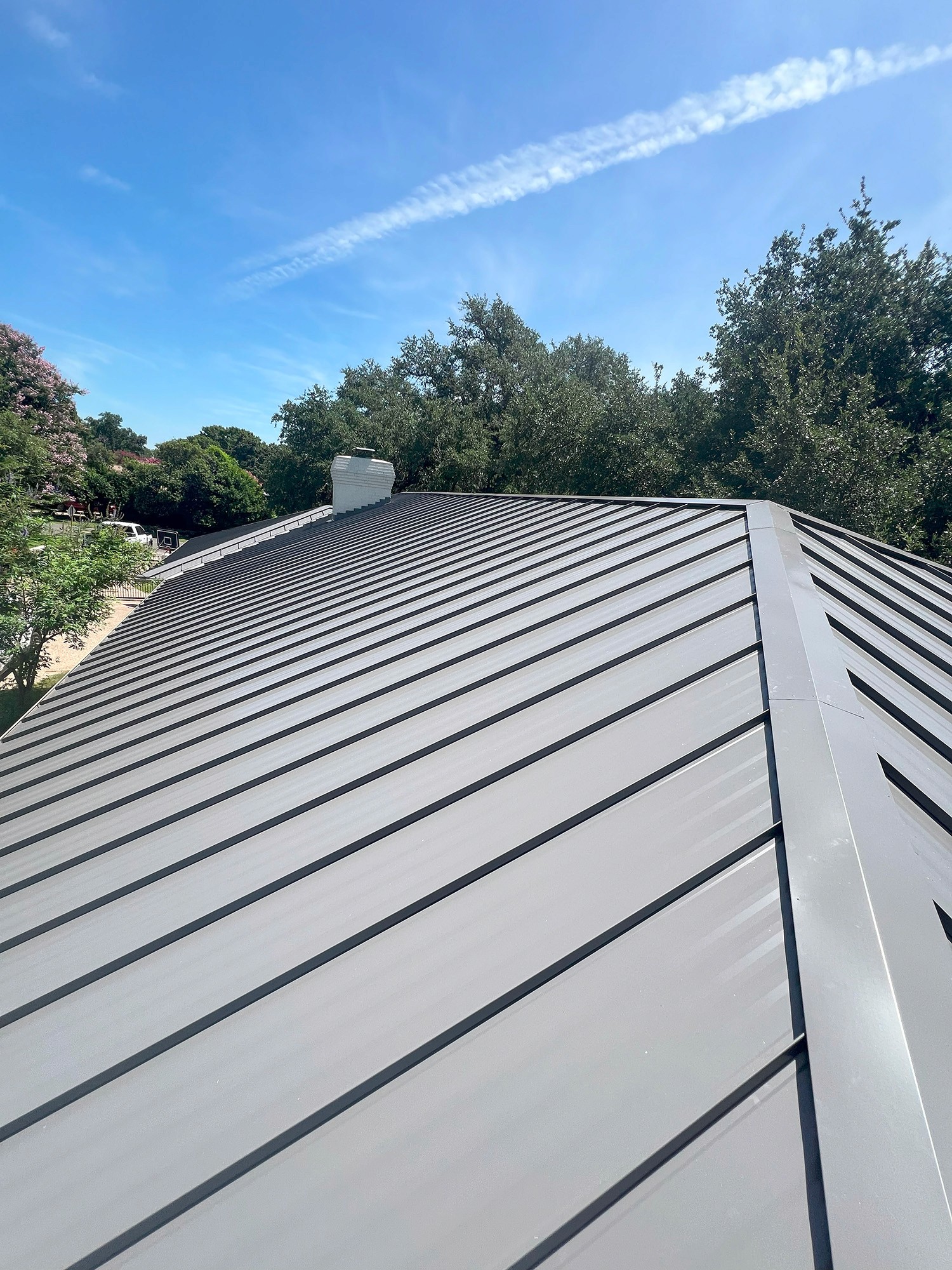
Asphalt Shingles
Asphalt shingles are a traditional roofing material commonly used in residential properties. Made from a fiberglass base coated with asphalt and topped with granules, shingle roofs are a popular choice due to their affordability and ease of installation.
Key Features of Asphalt Shingles:
Affordability: Asphalt shingles have a lower upfront cost compared to metal roofing.
Versatility: Available in various colors and styles to suit different aesthetic preferences.
Lifespan: Lasts 15-30 years, depending on weather conditions and maintenance.
Heat Absorption: Traditional shingles in hot climates tend to absorb more heat, increasing indoor temperatures.
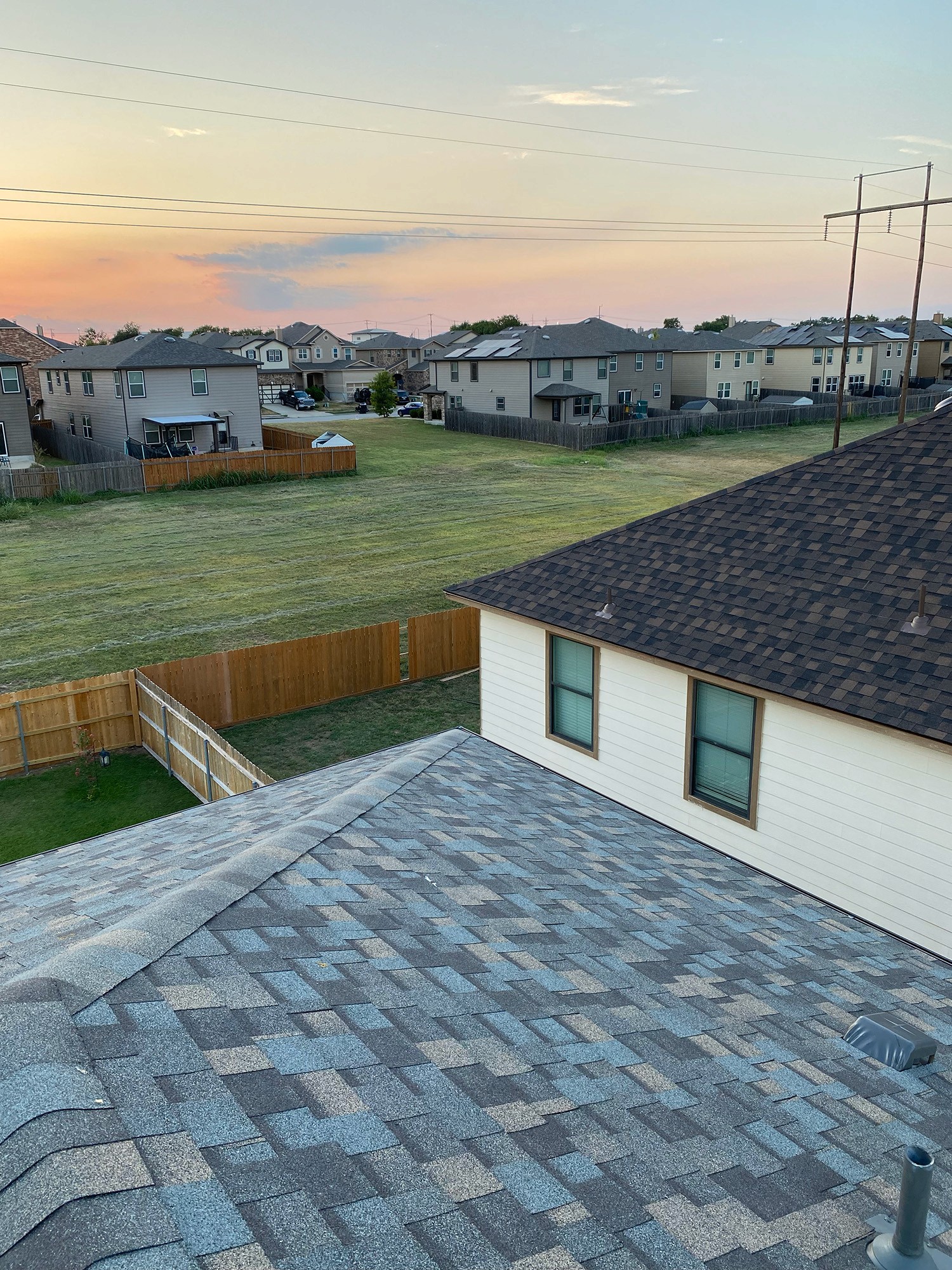
Metal Roof vs. Shingles: How They Perform in Hot Climates
Energy Efficiency
In warm climates like Texas or Florida, energy efficiency is a top concern for homeowners. A roof that reduces cooling costs can make a significant difference during the summer months.
Metal Roofs: Metal roofing materials, particularly those with reflective coatings or light-colored finishes, excel in reducing heat absorption. They reflect solar energy away from the home, keeping indoor temperatures cooler and lowering air conditioning usage. This leads to noticeable energy savings on energy bills.
Asphalt Shingles: Asphalt shingle roofs tend to absorb heat, especially darker-colored ones, which can raise indoor temperatures and increase energy costs. While light-colored shingles offer some improvement, they generally cannot match the reflectivity of metal panels.
Durability and Resistance to Weather Conditions
Texas and other warm climates often experience extreme weather, including heavy rain, high winds, and even hail. The durability of a roofing material is crucial to withstand such conditions.
Metal Roofs: Known for their resilience, metal roofs resist warping, cracking, and rotting. They perform well under severe weather and can handle high winds and heavy rain without significant damage. Although dents can occur in extreme hailstorms, modern metal roofs are designed to minimize this risk.
Asphalt Shingles: While traditional shingles are a popular choice, they are more prone to issues like cracking, warping, and granule loss under extreme temperatures or heavy rain. High winds can also loosen shingles, increasing the likelihood of roof repairs.
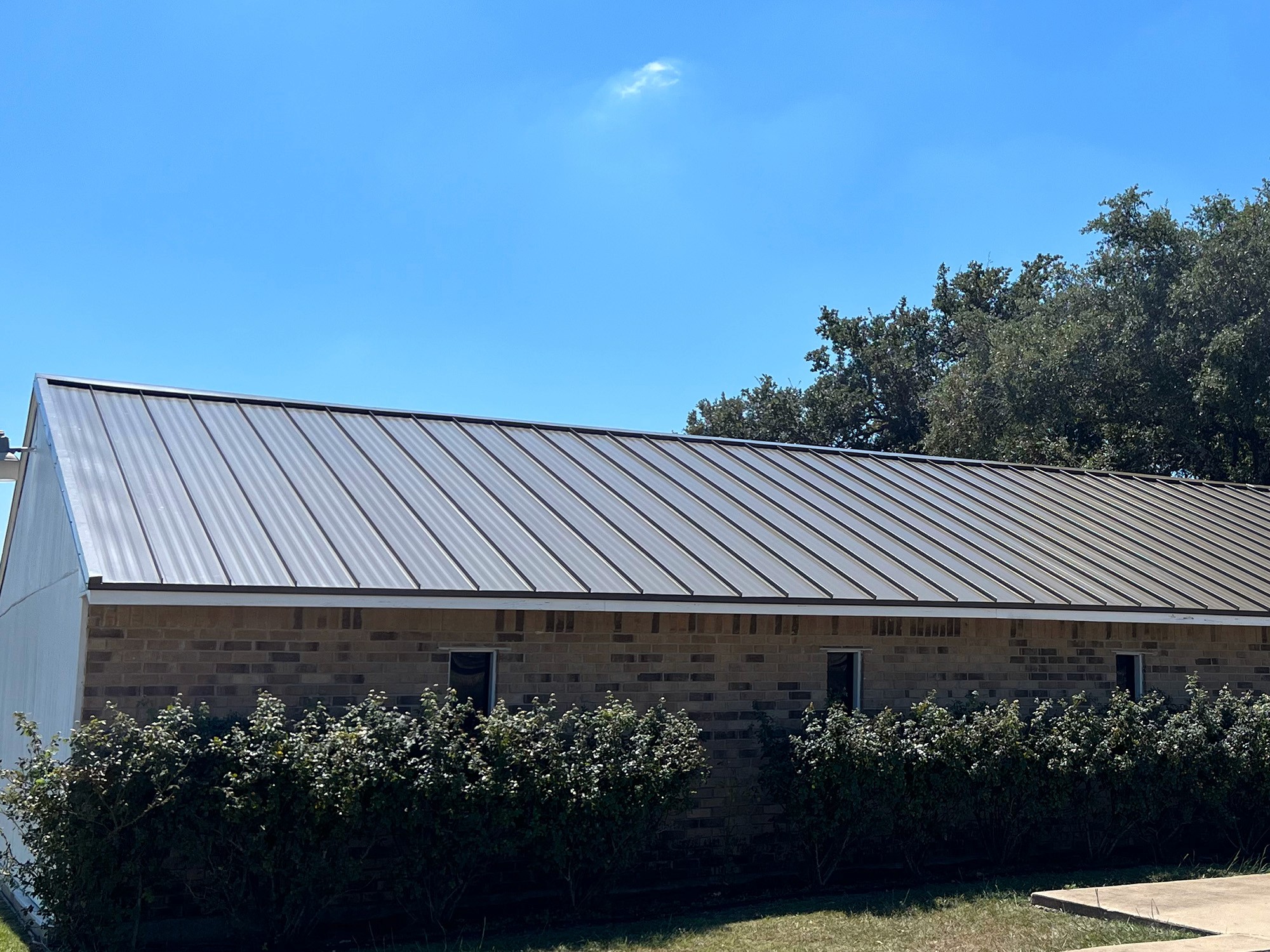
Longevity and Warranties
Metal Roofs: The long lifespan of metal roofs, coupled with minimal maintenance requirements, makes them an excellent long-term investment. Many manufacturers offer warranties of 30-50 years or more.
Asphalt Shingles: Asphalt shingle roofs have a shorter lifespan, typically lasting 15-30 years. Warranties on shingles often range from 10-25 years, with conditions that may exclude extreme weather damage.
Environmental Impact and Sustainability
Metal Roofs: Metal roofing is an eco-friendly option. It is made from recyclable materials and can often be recycled again at the end of its lifespan. Additionally, its reflectivity reduces the need for air conditioning, contributing to lower energy consumption.
Asphalt Shingles: While asphalt shingles are widely used, they are less environmentally friendly. Old shingles often end up in landfills, and their heat-absorbing properties can lead to higher energy usage during the summer months.
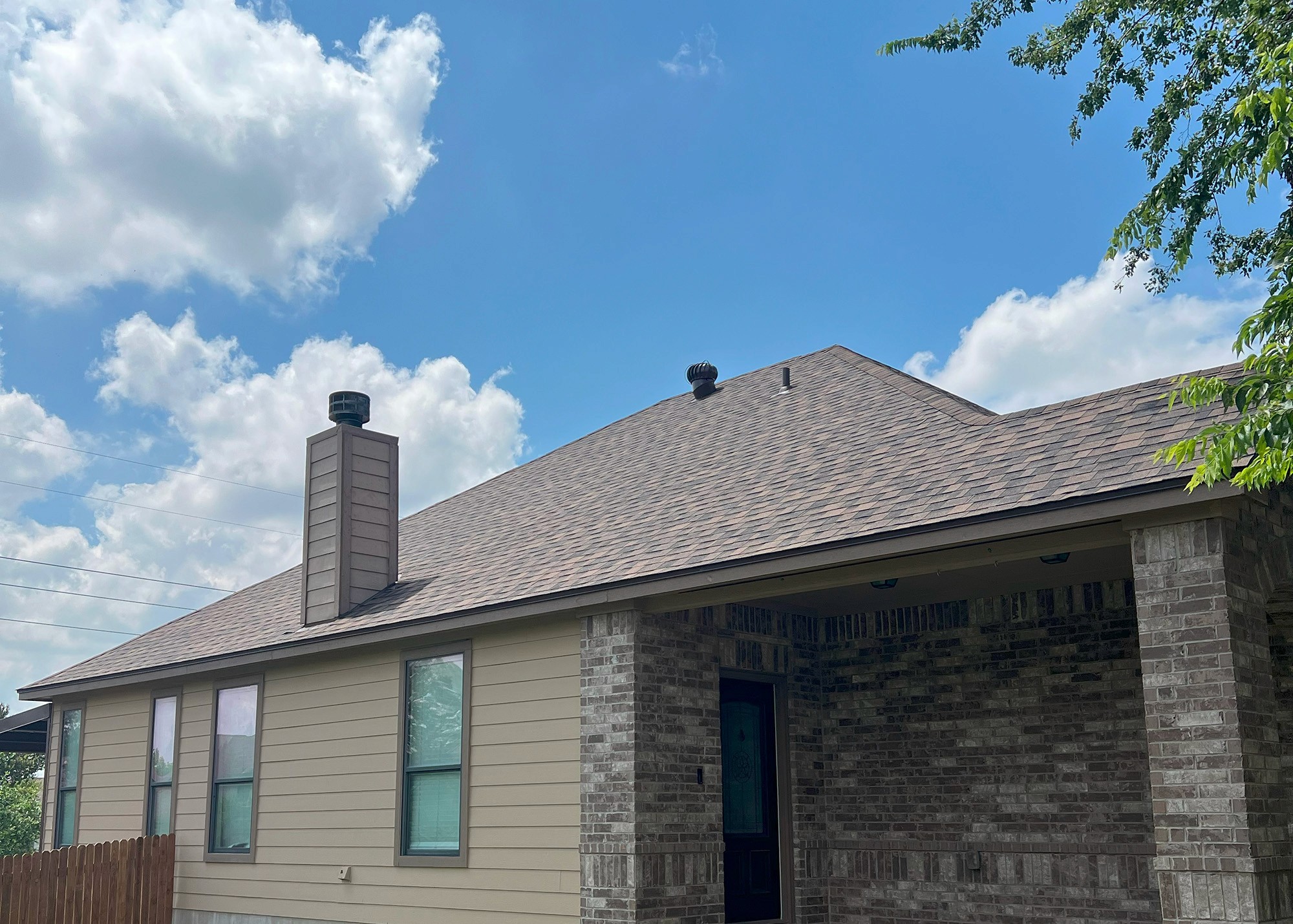
Upfront Costs vs. Long-Term Savings
One of the primary considerations for homeowners is the cost of a new roof.
Upfront Costs: Asphalt shingles are more affordable upfront, making them an attractive option for budget-conscious homeowners. Metal roofs, while more expensive initially, often pay off in the long run.
Long-Term Savings: Metal roofs’ energy efficiency and durability lead to significant savings on cooling costs, maintenance, and replacement. Over time, the energy savings from a metal roof can offset its higher upfront cost.
Maintenance Requirements
Metal Roofs: Metal roofs require little maintenance, thanks to their resistance to issues like warping, cracking, and granule loss. With proper insulation and underlayment, metal roofs maintain their performance and appearance for decades.
Asphalt Shingles: Shingle roofs require regular maintenance to address issues such as granule loss, cracks, or missing shingles. Without routine care, the lifespan of asphalt shingles can be significantly reduced.
Choosing the Right Roofing Solution for Your Home
When deciding between metal roofing and asphalt shingles in a hot climate, consider your priorities:
If energy efficiency, durability, and minimal maintenance are top concerns, metal roofing is an excellent choice.
If affordability and versatility are more important, asphalt shingles may meet your needs, particularly for shorter-term solutions.
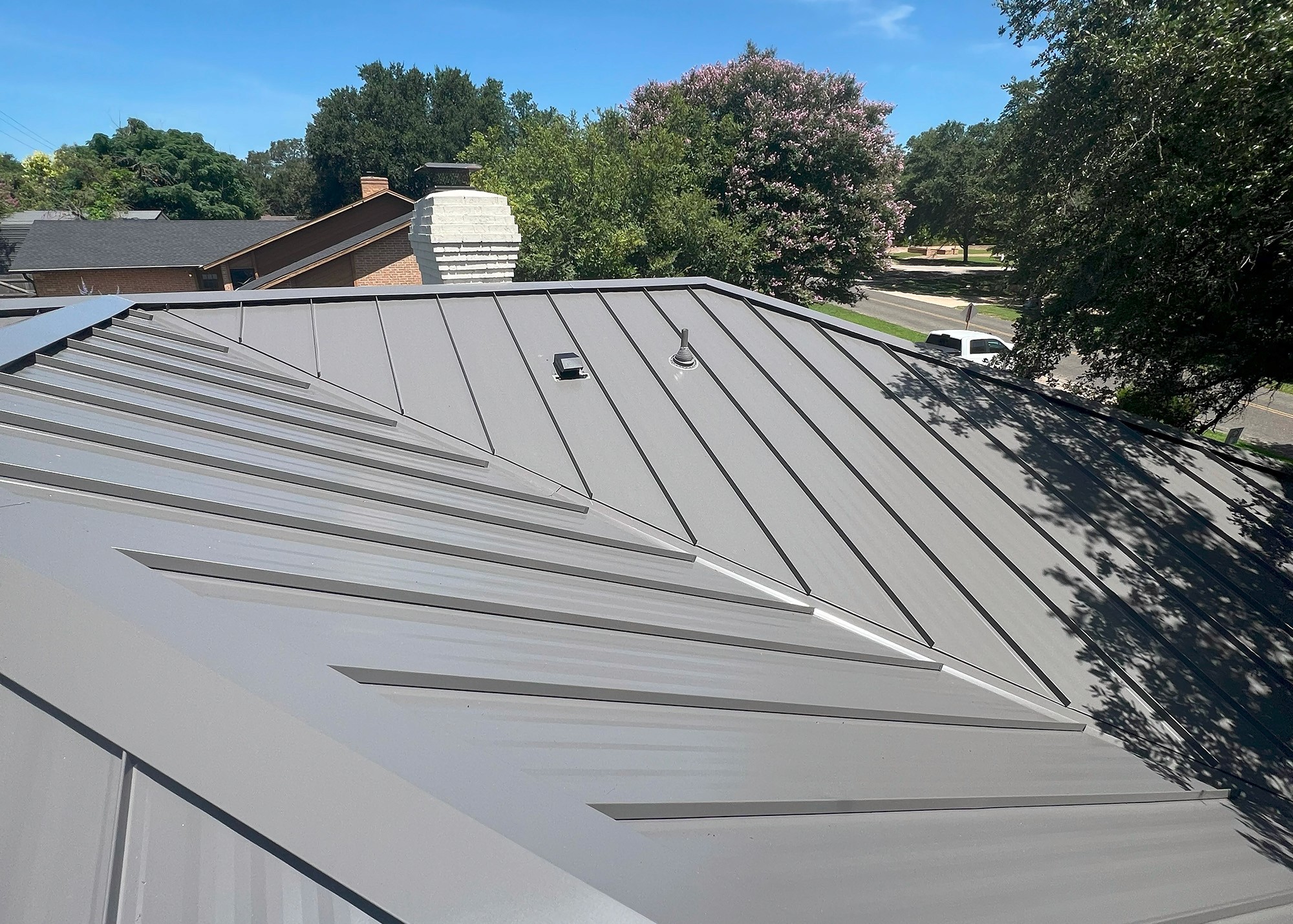
Common Concerns and Misconceptions
When deciding between metal roofs and asphalt shingles in hot climates, homeowners often have concerns that can influence their choice. Let’s address the most relevant ones to help you make an informed decision.
Will a Metal Roof Make My Home Hotter?
Contrary to popular belief, metal roofs actually help keep homes cooler, especially in warm climates. Their reflective coatings bounce solar heat away from the home, reducing heat absorption and lowering indoor temperatures. In contrast, asphalt shingles—especially dark-colored ones—tend to retain heat, which can increase cooling costs during summer months.
Are Metal Roofs Too Expensive?
While the upfront cost of a metal roof is higher than that of asphalt shingles, it’s important to look at the big picture. Metal roofs last significantly longer—up to 70 years compared to 15-30 years for asphalt shingles—and require minimal maintenance. Additionally, their energy-efficient design can lead to significant savings on cooling costs, helping to offset the initial investment over time.
Are Asphalt Shingles Suitable for Hot Climates?
Asphalt shingles are a popular choice due to their affordability, but they’re not ideal for hot climates. They absorb more heat, which can raise indoor temperatures and increase air conditioning usage. While light-colored or reflective shingles can perform better in warm climates, they still can’t match the energy efficiency of metal roofing.
Do Metal Roofs Dent Easily in Hail?
Homeowners in areas prone to hailstorms often worry about dents on metal roofs. However, modern metal roofing systems are engineered for durability and can withstand impacts from hail and other debris. Thicker metal panels and standing seam designs offer additional strength, making them suitable for severe weather conditions.
Are Metal Roofs Noisy During Rain?
This is a common misconception. When installed with proper underlayment and insulation, metal roofs are no noisier than asphalt shingles during rain or storms. In fact, the sound-dampening layers can make metal roofs quieter than you might expect.
By addressing these common concerns, it’s clear that metal roofs offer significant advantages for homeowners in hot climates. If you’re unsure about which roofing material is best for your home, reach out to Atlas Roofing Pros for expert guidance!
Conclusion: Making the Right Choice for Your Home
Choosing the right roofing material is essential, especially in hot climates like Texas. While asphalt shingles may offer affordability and versatility, metal roofs excel in every category that matters most: energy efficiency, durability, and long-term savings. With their ability to reflect heat, resist severe weather, and require minimal maintenance, metal roofs are a smart, long-lasting investment that can help keep your home cooler and your energy costs lower.
At Atlas Roofing Pros, we’re here to make your decision easier. Whether you’re ready to install a durable metal roof or need guidance on the best roofing option for your home, our expert team has the experience and knowledge to deliver exceptional results. Contact us today for a free consultation and let us help you protect your home with a roofing solution built for Texas heat and weather. Don’t wait—secure a stronger, more energy-efficient roof today!
Protect Your Home with
Atlas Roofing Pros
Get a Free Consultation
